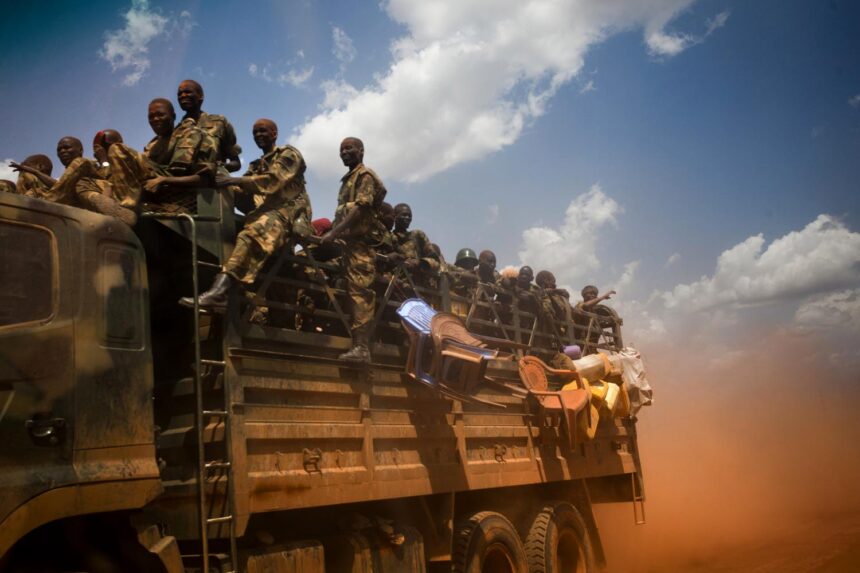Khartoum – The Sudanese capital was again under fire Wednesday after the latest breached ceasefire between warring generals ended without any sign of an end to more than two months of war.
An immense fire had already engulfed the intelligence service’s headquarters in the capital Khartoum on Tuesday evening, with each side accusing the other of attacking it in violation of the 72-hour truce mediated by the United States and Saudi Arabia.
Mediators had repeated a warning that if the ceasefire – which ended at dawn on Wednesday – were not respected, they would consider adjourning talks between the warring sides in Jeddah, Saudi Arabia.
The International Committee of the Red Cross had earlier said the “ceasefire was not respected”, and cited gunshots that forced the agency to abort a transfer of wounded soldiers.
Fighting began on 15 April between the regular army, led by Abdel Fattah al-Burhan, and the paramilitary Rapid Support Forces (RSF), headed by his former deputy Mohamed Hamdan Daglo. Numerous ceasefires have been announced, only to be violated, despite commitments by the two sides to provide for secure aid access.
The latest truce, which coincided with an international donors’ conference in Geneva on Monday, did, however, bring a brief respite to the millions of civilians trapped by fighting in the capital and suffering shortages of medical care, electricity, water and other essentials.
But an exodus of refugees — and wounded — continued from the war’s other main battleground Darfur.
On Wednesday morning, residents of Omdurman, just across the Nile from Khartoum, reported heavy artillery exchanges within minutes of the ceasefire expiring at 06h00.
Army warplanes flew low over several adjacent districts, the residents said.
Nationwide, more than 2 000 people have been killed since battles began, the Armed Conflict Location and Event Data Project said.
More than 2.5 million people have fled their homes, of whom around 600 000 have sought refuge in neighbouring countries, according to latest figures from the International Organisation for Migration (IOM).
The United States State Department said up to 1 100 people have been killed in the West Darfur state capital El Geneina alone.
Bodies have remained on the streets of the city, where months of unrest have left shops either vacant or gutted by looters.
One lay covered on the asphalt, in front of an armoured vehicle. A dead man was partially curled up outside a house. Several others appeared to be lying face down together on a dirt road. More than 155 000 people have fled Darfur into Chad since the start of fighting, according to IOM.
Some described being shot at by fighters and subjected to searches during the perilous journey.
The United Nations has spoken of possible “crimes against humanity” in Darfur as the conflict has “taken an ethnic dimension”.
The region is still reeling from a 2003 rebellion among non-Arab minorities which prompted then-strongman Omar al-Bashir to recruit the Arab Janjaweed militia, whose actions led to charges of genocide, war crimes and crimes against humanity.
Washington has said the RSF, which traces its origins to the Janjaweed, is “primarily” responsible for recent “atrocities” in Darfur.
In an audio recording on Tuesday, Daglo denounced what he called “a tribal conflict” in El Geneina, claiming to have ordered his men “not to intervene”, and accusing the army of “creating sedition by distributing weapons” to civilians.
Monday’s donors’ conference raised close to US$1.5 billion in aid pledges for Sudan and neighbouring countries, but that amounted to less than half of the estimated needs.
A record 25 million people — more than half Sudan’s population — are in need of aid and protection, the United Nations says.
The Islamic Relief charity on Wednesday said “many farmers have been unable to plant at the start of the rainy season” as a result of the fighting.
“The conflict has forced many smallholder farmers from their land and destroyed their seed stocks and markets,” it added, in a country which relies primarily on agriculture for its income.
UN chief Antonio Guterres warned this week that “the scale and speed of Sudan’s descent into death and destruction is unprecedented”, and the country could become a “locus of lawlessness” without strong international intervention.
The chief of the UN’s World Health Organisation, Tedros Adhanom Ghebreyesus, on Wednesday confirmed “46 attacks on healthcare since the start of the fighting”.
He said about two-thirds of health facilities in areas affected by the war are “out of service,” and warned that “the risk of epidemics will only increase” with the rainy season due to start this month. Nampa / AFP


